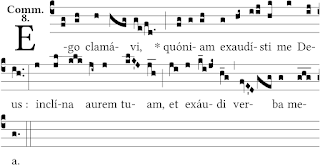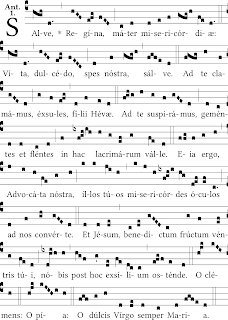At least in most of it, for the time being; an inch of rain beginning later on, so they say, but this morning's walk was quite pleasant indeed. It is the 22nd Sunday post Pentecosten, the 2nd... ah, no, it is the 3rd Sunday of November in the Office-- why, I'm not sure although I know I've read somewhere about the IIa Novembris dropping out et cetera; it was here, doubtless. Dr DiPippo explains the business-- the 'TL;DR' ('too long, didn't read') version is that in consequence of Ioannes XXIII's liturgical game of musical chairs one of November's potential five weeks had to be suppressed.
We began last Sunday, Ia Novembris, the Prophet Ezechiel; today, lessons from the Prophet Daniel. Next Sunday, IVa Novembris, lessons from the Prophets Osee (followed by Joel, Amos, and Ionas on the days that admit the ferial lessons); and on the 20th, the Va Novembris, lessons from the Prophet Michaea (followed by Aggaeus, Zacharias, and Malachias). Am presuming that Abdias, Nahum, Habacuc, and Sophonias appear in the nocturns, also, were the entire run of days ferial and not some of them given over to the sanctoral Office. But it is better to read Dr DiPippo's exposition linked supra.
... The first Sunday of each of these months is the day on which the Church begins to read a new set of Scriptural books at Matins, with their accompanying responsories, and antiphons at the Magnificat at Vespers of Saturday; these readings are part of a system which goes back to the sixth century. In August, the books of Wisdom are read; in September, Job, Tobias, Judith and Esther; in October the books of the Macchabees; in November, Ezechiel, Daniel, and the twelve minor Prophets. (September is actually divided into two sets of readings, Job having a different set of responsories from the other three books.)
The Mass today is Si iniquitates observaveris Domine. I had a very decent night's sleep, I'm afraid, and didn't rise at 0140 for Holy Mass streamed from Saint-Eugène.
Introitus. Ps. 129, 3-4. Si iniquitátes observáveris, Dómine: Dómine, quis sustinébit? quia apud te propitiátio est, Deus Israël. Ps. ibid., 1-2. De profúndis clamávi ad te, Dómine: Dómine, exáudi vocem meam. ℣. Glória Patri.
Oratio. Deus, refúgium nostrum et virtus: adésto piis Ecclésiæ tuæ précibus, auctor ipse pietátis, et præsta; ut, quod fidéliter pétimus, efficáciter consequámur. Per Dóminum.
Léctio Epístolæ beáti Pauli Apóstoli ad Philippénses
Philipp, 1, 6-11.
Fratres: Confídimus in Dómino Jesu, quia, qui cœpit in vobis opus bonum, perfíciet usque in diem Christi Jesu. Sicut est mihi justum hoc sentíre pro ómnibus vobis: eo quod hábeam vos in corde, et in vínculis meis, et in defensióne, et confirmatióne Evangélii, sócios gáudii mei omnes vos esse. Testis enim mihi est Deus, quómodo cúpiam omnes vos in viscéribus Jesu Christi. Et hoc oro, ut cáritas vestra magis ac magis abúndet in sciéntia et in omni sensu: ut probétis potióra, ut sitis sincéri et sine offénsa in diem Christi, repléti fructu justítiæ per Jesum Christum, in glóriam et laudem Dei.
Graduale. Ps. 132, 1-2. Ecce, quam bonum et quam jucúndum, habitáre fratres in unum! ℣. Sicut unguéntum in cápite, quod descéndit in barbam, barbam Aaron.
Allelúja, allelúja. ℣. Ps. 113, 11. Qui timent Dóminum sperent in eo: adjútor et protéctor eórum est. Allelúja.
✠ Sequéntia sancti Evangélii secúndum Matthǽum.
Matth. 22, 15-21.
In illo témpore: Abeúntes pharisǽi consílium iniérunt, ut cáperent Jesum in sermóne. Et mittunt ei discípulos suos cum Herodiánis, dicéntes: Magíster, scimus, quia verax es et viam Dei in veritáte doces, et non est tibi cura de áliquo: non enim réspicis persónam hóminum: dic ergo nobis, quid tibi vidétur, licet censum dare Cǽsari, an non? Cógnita autem Jesus nequítia eórum, ait: Quid me tentátis, hypócritæ? Osténdite mihi numísma census. At illi obtulérunt ei denárium. Et ait illis Jesus: Cujus est imágo hæc et superscríptio? Dicunt ei: Cǽsaris. Tunc ait illis: Réddite ergo, quæ sunt Cǽsaris, Cǽsari; et, quæ sunt Dei, Deo.
Offertorium. Esth. 14, 12 et 13. Recordáre mei, Dómine, omni potentátui dóminans: et da sermónem rectum in os meum, ut pláceant verba mea in conspéctu príncipis.
Michel Imbert is known only through this method or, more precisely, thanks to its second part. Dedicated to l’usage du serpent, this is one of the rare sources that informs us about the learning of this instrument commonly used (under the Ancien Régime and into the 19th century) to double the voice of singers. Although only about fifty pages, the first book of this 'New Method' nevertheless provides a course in the method of plainchant, which, although conceived as a preparatory stage for the study of the serpent, was usable also independently....I wonder what the relationship is between Michel and the composer and critic (born in Sens) Maurice Imbert (1893-1981).
Postcommunio. Súmpsimus, Dómine, sacri dona mystérii, humíliter deprecántes: ut, quæ in tui commemoratiónem nos fácere præcepísti, in nostræ profíciant infirmitátis auxílium: Qui vivis et regnas.
--solesmes.png)







Comments
Post a Comment